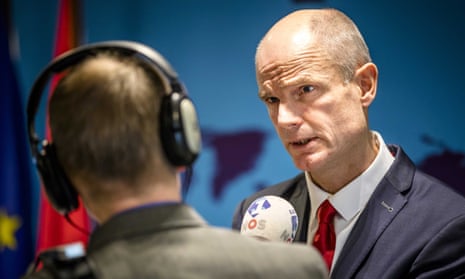Iran has been accused by the Dutch government of directing two political assassinations in the Netherlands, triggering EU sanctions against Tehran’s military intelligence service.
The two murders are alleged to have taken place in broad daylight in 2015 in Almere, a city east of Amsterdam, and in 2017 on a street close to the Dutch foreign ministry in The Hague.
In a written statement to the Dutch parliament, Stef Blok, the country’s foreign minister, said intelligence services had found “strong indications that Iran was involved in the assassinations of two Dutch nationals of Iranian origin”.
Blok added the government believed such “hostile actions” violated Dutch sovereignty.
The man killed in 2015 was named as Mohammad Reza Kolahi Samadi, 56, who had previously been sentenced to death in Iran after being accused of planting a bomb at the Islamic Republic party’s headquarters in 1981, killing 73 people.
Among those killed in the bomb attack was the second-in-command to Ayatollah Ruhollah Khomeini, then Iran’s supreme leader. Samadi, who had been in the building shortly before the explosion, was accused of the attack and fled to Europe. He was sentenced to death in absentia.
With his wife and teenage son, he had lived in Almere, working as an engineer under the alias Ali Motamed. He was shot in the head at point-blank range by two assailants dressed in black, in what was claimed to have the hallmarks of a contract killing.
Two years later, the Iranian activist Ahmad Molla Nissi, 52, who founded an Arab nationalist group seeking an independent state inside Iran, was also shot in the head as he walked through The Hague.
On Tuesday, the EU imposed sanctions against two Iranians and the country’s military intelligence service in response to the allegations.
The Dutch government said the expulsion in June 2018 of two diplomats from the Iranian embassy in the Netherlands had been in retaliation for the murders and the Iranian ambassador had been summoned at the time.
Dick Schoof, the director general of the Dutch security service, the AIVD, said it was involved in “intense” efforts with other countries to research the extent of Iranian “interference” in Europe.
Last year, France and Denmark also accused Iran of plotting attacks on European soil, involving a foiled bombing attack that targeted a rally organised by an Iranian opposition group near Paris in June 2018 and the assassination of the exiled leader of the Arab Struggle Movement for the Liberation of Ahvaz (ASMLA), a separatist group with a history of carrying out attacks in Iran.
The development has thrown EU-Iran relations into crisis at a time when Brussels is straining to keep alive the accord under which sanctions against Tehran were lifted in return for it lowering its nuclear ambitions. Last year, the US president, Donald Trump, pulled out of the agreement, describing it as a “rotten deal”.
